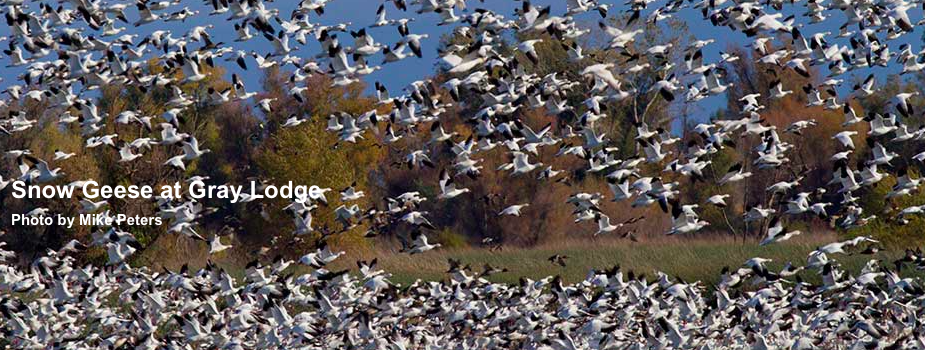2018 archives
Most Recent Programs first
THE CAMP FIRE:
CLIMATE CRISIS AND GREEN REBUILDING
EC0 487 11 DECEMBER 2018
In this program, we discussed rebuilding after the Camp Fire as well as growing concern that the world must take dramatic action now to reverse the effects of global warming. Many environmentalists have spoken out to propose that even in these horrendous times, there is an opportunity for making certain that construction incorporates green principles. We spoke with people from three groups that are taking action along these lines.

First we talked with Mary Kay Benson and Ann Ponzio of Chico 350. They are putting forward proposals to Chico City Council to take steps to increasing the attention being paid to green design practices during the recovery. Their resolution calls for an Emergency Mobilization to make Chico carbon neutral by 2030, an effort that would not only involve the city, but the full range of community members and agencies. Reach them at <chico350.org> or Facebook at Chico 350.

Then we interviewed Thomas McCairn, founder of CAUS--Community Action United for a Sustainable Environment--an environmental group at CSU, which is are making similar efforts for a Resolution for Climate Change at Chico State. Read all about their work at causeatchico.com

And finally, we spoke with Wes Owen, a member of the local chapter of Democratic Socialists of America, who are exploring ways in which the potential bankruptcy of PG&E could allow communities to take control of their own, green electricity needs. Reach the Chico Chapter of DSA at Twitter/Instagram/Facebook : @dsachico or dsachico Website https://chicodsa.org Our Email
[email protected] Our Chico Chapter Phone 530-715-0052
Listen to this outstanding program. Click on the link below
[email protected] Our Chico Chapter Phone 530-715-0052
Listen to this outstanding program. Click on the link below
THE CAMP FIRE: GRIEVING AND RECOVERY
ECO 486 4 DECEMBER 2018

In this program, we spoke with people who are doing grief and recovery counseling for people who have been affected by the Camp Fire. Malama McNeill and Heather Springer are leaders of the services being provided by North Valley Mutual Aid and Council for Grieving at the Chico Women’s Club for the next several weeks. “Mutual Aid Support for Grieving and Carrying On” is being provided Mondays and Thursdays and will continue until the end of December.
Katrien Ahiligwo , a life coach and RN, is providing an ongoing support group for victims and survivors of the Campfire disaster through the month of April. Marc Sorenson has been practicing meditation for over 40 years and has been sharing his knowledge with private clients, and in classes and workshops since the 1980s. He is providing free sessions to the community called Calming Crisis and Nuturing Our Wellbeing.
These amazing people offered their stories and perspectives on emotional recovery from the fires.
Listen to the program. Click on the link below.
Katrien Ahiligwo , a life coach and RN, is providing an ongoing support group for victims and survivors of the Campfire disaster through the month of April. Marc Sorenson has been practicing meditation for over 40 years and has been sharing his knowledge with private clients, and in classes and workshops since the 1980s. He is providing free sessions to the community called Calming Crisis and Nuturing Our Wellbeing.
These amazing people offered their stories and perspectives on emotional recovery from the fires.
Listen to the program. Click on the link below.
CURRENT ENVIRONMENTAL NEWS
AND TAKING ACTION
ECO 484 27 NOVEMBER 2018
In this program we reviewed some recent news about technological and political progress (or lack of progress) in the environmental arena. And we introduced a new Ecoltopia feature, “taking action,” outlining some places, local to global, where you can engage with and express opinions about what’s happening in the environmental world. The links to articles and actions are below.
The first sea bin designed to trap marine plastics has been installed in Northern Ireland.
https://www.bbc.com/news/uk-northern-ireland-46267529
Update on the Pacific Garbage Patch
https://www.theoceancleanup.com/updates/wilson-update-tweaking-the-system/
Part of the Answer to Climate Change May Be America’s Trees and Dirt
https://www.nytimes.com/2018/11/14/climate/climate-change-natural-solutions.html
A new report on the potential of heavy industry to combat climate change offers a rare slice of optimism
www.bbc.com/news/business-46263770
"Are We Doomed?"
https://www.nytimes.com/2018/11/19/science/climate-change-doom.html
Steven Pinker Thinks the Future Is Looking Bright
https://www.nytimes.com/2018/11/19/science/steven-pinker-future-science.html
The first sea bin designed to trap marine plastics has been installed in Northern Ireland.
https://www.bbc.com/news/uk-northern-ireland-46267529
Update on the Pacific Garbage Patch
https://www.theoceancleanup.com/updates/wilson-update-tweaking-the-system/
Part of the Answer to Climate Change May Be America’s Trees and Dirt
https://www.nytimes.com/2018/11/14/climate/climate-change-natural-solutions.html
A new report on the potential of heavy industry to combat climate change offers a rare slice of optimism
www.bbc.com/news/business-46263770
"Are We Doomed?"
https://www.nytimes.com/2018/11/19/science/climate-change-doom.html
Steven Pinker Thinks the Future Is Looking Bright
https://www.nytimes.com/2018/11/19/science/steven-pinker-future-science.html
CAMP FIRE: the future
ecotopia 483 13 november 2018
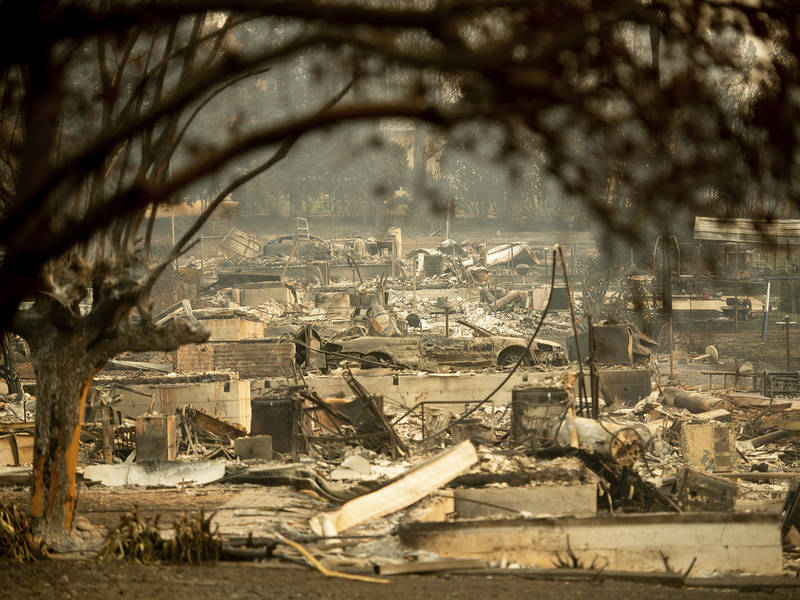
This program was done even as the Camp Fire continued to ravage the community of Paradise and surrounding towns. It was a panel of community leaders offering a variety of perspectives on what has happened and what can or will happen following this catastrophe. Our guests included:
Miles Montalbano, Mutual Aid Disaster Relief
Karen Laslo, Photographer
Leslie Layton, Chico Sol
Mark Albert, NSPR Reporter
Natalie Carter, Executive Director, Butte Environmental Council
Jan Biefelt, community activist
Malama McNeil, grief tender and community elder
Scott Huber, Chico City Councilor-Elect
Listen to their perceptive comments. (The show was repeated on November 20.)
Miles Montalbano, Mutual Aid Disaster Relief
Karen Laslo, Photographer
Leslie Layton, Chico Sol
Mark Albert, NSPR Reporter
Natalie Carter, Executive Director, Butte Environmental Council
Jan Biefelt, community activist
Malama McNeil, grief tender and community elder
Scott Huber, Chico City Councilor-Elect
Listen to their perceptive comments. (The show was repeated on November 20.)
pOP tALKS AND WATER FILMS
ECOTOPIA 482 6 nOVEMBER 2018
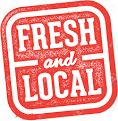
In this two-part program, we spoke first with Sammey Zangrilli of Turkeytail Farm, Kala Riddle of Untamed Bakery, and Angel Gomez of the Butte Environmental Council, who are sponsoring a series of "Pop Talks" on local foods at the Cafe Coffee in Chico. Local farmers and food producers will give presentations on topics ranging from cider to mushrooms, from wholegrain breads to sustainable coffee. This will be an ongoing series, with the first event taking place on Saturday, November 10.
Listen to the Interview.Click on Link below.
Listen to the Interview.Click on Link below.

Then we spoke with Professor Jesse Dizard of the Chico State Anthropology Department. He is a filmmaker and is presenting two films, Treading Water and Stolen Paradise at the Valene L. Smith Museum's third annual In Focus Film Festival, held Sunday, November 11, at the Chico Women's Club, 4-6 pm. His films focus on preserving the human right of clean fresh water, with particular emphasis on recognizing and recovering native American rights and practices.
Listen to the Interview. Click on the link following.
Listen to the Interview. Click on the link following.
WILD AND SCENIC FILM FESTIVAL:
FRIENDS OF BUTTE CREEK
ECO 479 OCTOBER 16, 2018

We spoke with Alan Harthorn and Pamela Posey of Friends of Butte Creek about their upcoming Wild and Scenic Film Festival taking place on Saturday, October 27 at the Sierra Nevada Big Room. We also spoke on the phone with Caleen Sisk, spirtual leader and tribal chief of the Winnemen Wintu tribe, which is fighting the raising of Shasta Dam that will inundate Native American sacred sites and further disrupt the access of salmon to the McCloud River. This festival is now in its twelfth year and provides access to some of the most important environmental films of the past year. For more information , go to www.buttecreek.org
Listen to the Program
Listen to the Program
BIG CHICO CREEK ECOLOGICAL RESERVE:
WHERE EDUCATION MEETS THE LAND
ECO 477 OCTOBER 2, 2018
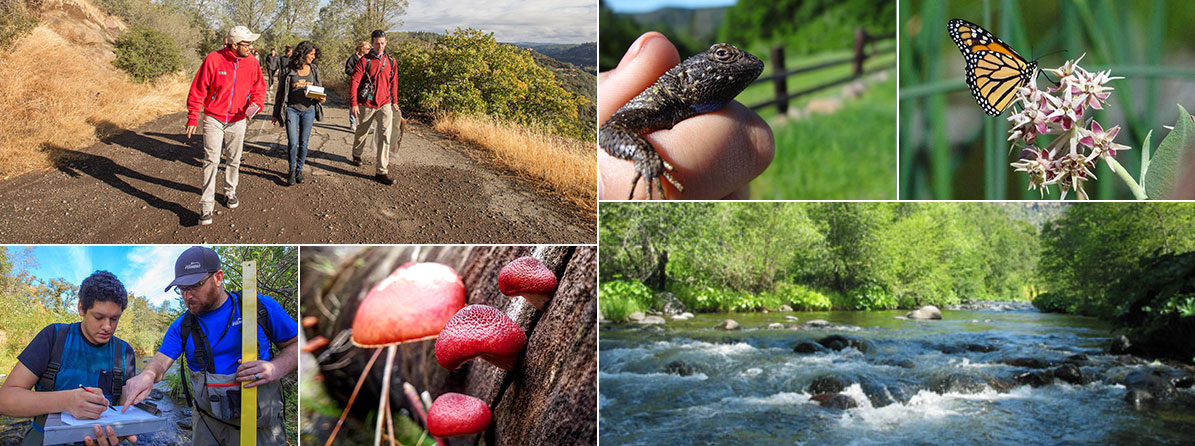
On this edition of Ecotopia, we interviewed Eli Goodsell, who is the Manager of the CSU Ecological Reserves including the Big Chico Creek Ecological Reserve located up Highway 32 about 15 minutes from Chico. He is an especially engaging interviewee and we ran out of time before we were able to ask him all the questions we had in mind. But he told us about the geography and ecology of the reserve, its impressive educational programs for k-12 and college/university students, its important research projects, and how the public can take advantage of this great resource right in our neighborhood. We'll have him back to talk more about the Reserve's Native American cultural background and how it is open as a hunting reserve at certain times of the year. Check out the reserve at https://www.csuchico.edu/bccer.
To listen to the program. Click below.
To listen to the program. Click below.
COMMUNITY CHOICE ELECTRICITY
ECO 476 25 SEPTEMBER 2018

Our guests were Erik Gustafson, Public Works Director for the Operation and Maintenance Divisions for the City of Chico and Casey Hatcher, Economic and Community Development Manger for Butte County.
Butte County and the City of Chico are currently researching whether Community Choice Aggregation (CCA) could be a good opportunity for its communities. CCA is a program that allows cities, counties and other qualifying governmental entities to purchase and/or generate electricity for their residents and businesses.
www.power.buttecounty.net. We asked them about the advantages and disadvantages of CCA, the results of their feasibility study and public meetings, and how the system would work to bring electric savings and green energy to the community.
Listen to the Program; click below.
Butte County and the City of Chico are currently researching whether Community Choice Aggregation (CCA) could be a good opportunity for its communities. CCA is a program that allows cities, counties and other qualifying governmental entities to purchase and/or generate electricity for their residents and businesses.
www.power.buttecounty.net. We asked them about the advantages and disadvantages of CCA, the results of their feasibility study and public meetings, and how the system would work to bring electric savings and green energy to the community.
Listen to the Program; click below.
TECHNOFIX REVISITED
ECO 475 18 SEPTEMBER 2018
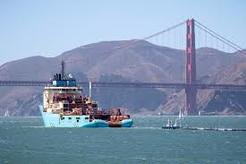
In this program we presented news items about technical innovations to help reduce or even reduce climate change. However, we voiced a good deal of skepticism based on our earlier interview with Michael Heuseman, author of Technofix, who warned that it is naive to expect a genie from a bottle or a deus ex machina to solve climate problems. While there are some technical innovations that may help, we humans will simply have to change our ways and not expect technology to save us from going over the cliff.
Pictured: Engineers have launched a huge garbage collection device to gather plastic material floating in the Pacific Ocean between California and Hawaii.
Listen to the Program
Pictured: Engineers have launched a huge garbage collection device to gather plastic material floating in the Pacific Ocean between California and Hawaii.
Listen to the Program
HOW TO CUSS IN WESTERN
ECO 470 31 JULY 2018
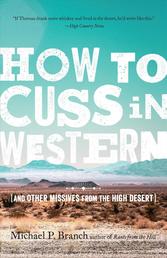
Our guest on this program was Mike Branch, Professor of English at the University of Nevada, and author of How to Cuss in Western (and Other Missives from the High Desert). He and his family live in a remote section of Nevada high desert north of Reno, where he issues "rants" on topics ranging from human behavior and foibles to the state of the environment (and the universe). In this program, we talked some of the topics in his new book, including how to cuss in western (a comprehensive look at western phrases and expressions from yesteryear), giant ants in the desert (Them!), how to stalk a tree, and the cultural effects of fencing in the west. Mike has been a regular contributor to High Country News, which in turn has led to several books of essays. In addition to being a professor for his day job, Mike is an outdoorsman, blues harp player, hiker, woodchopper, and practitioner of other skills required where he lives.The book is published by Roost Books, an imprint of Shambhala Publications of Boulder. You can learn more about Mike and his work at michaelbranchwriter.com.
Listen to the program. Click below.
Listen to the program. Click below.
ZERO EMISSIONS
ECO 467 JULY 10, 2018

Our guests on this program were Dave Garcia and Mary /Kay Benson. Dave is the guy you see around town carrying a load of posters, fliers, and handouts on a variety of local issues. He was the leader in the successful campaign to ban fracking in Butte County and has worked to alert us to the dangers of oil trains passing down the Feather river. Mary Kay Benson is equally involved as an activist with local and statewide 350.org activities, fighting to reduce climate change.She's also involved in the campaign to Keep Oil Money Out of Politics. They began with a discussion of SB 100, a bill currently working its way through the California legislature. It is intended to accelerate the requirements of the state’s primary renewable energy program—the Renewables Portfolio Standard (RPS)—from 50 percent to 60 percent by 2030 and commit the state to 100 percent zero-carbon electricity by 2045. SB 100 leaves open opportunities for new technologies and innovation and does not restrict what qualifies as zero-carbon.They also told us about a big march called Rise for Climate Jobs and Justice, taking place in San Francisco in September. Chico 350 will be taking busloads of participants. In addition, Mary Kay told us about a giant mural project with contributions-50 x 50 foot panels--from participating communities. Info about the event is at https://ca.riseforclimate.org. For information about participating in the mural project, contact Mary Kay at [email protected].
Listen to the program. Go to http://kzfr.org/shows/ecotopia and scroll down to July 10.
Listen to the program. Go to http://kzfr.org/shows/ecotopia and scroll down to July 10.
CALIFORNIA BURNING
ECO 464 JUNE 19, 2018
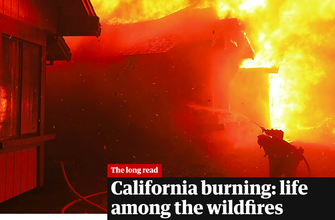
Our guest was an explorer of ecosystems through her fiction and nonfiction writing. Christina Nichol is the author of two articles that caught our eye, “California Burning,” which appeared in The Guardian, and a longer version of the essay that appeared in N + 1 Magazine under the title “An Account of My Hut.” Christina teaches environmental courses at Sonoma State. She did her undergraduate work at the University of Oregon and has an MFA from the University of Florida. She has traveled the world teaching and working for nonprofits in places as far flung as India, South Korea, Kyrgystan, Kazakhstan, and the Republic of Georgia, which is the setting for her novel, Waiting for the Electricity. She read to us about California burning and also told us about Kamo no Chōmei, a 12th-century Japanese poet, who, after witnessing a fire, an earthquake, and a typhoon in Kyoto, left society to become a hermit and to write an account of his hut. Check out the articles at:
https://nplusonemag.com/issue-31/essays/an-account-of-my-hut/
https://www.theguardian.com/news/2018/may/04/california-burning-life-among-the-wildfires-climate-change
To listen to the interview, go to http://kzfr.org/shows/ecotopia and scroll down to June19.
https://nplusonemag.com/issue-31/essays/an-account-of-my-hut/
https://www.theguardian.com/news/2018/may/04/california-burning-life-among-the-wildfires-climate-change
To listen to the interview, go to http://kzfr.org/shows/ecotopia and scroll down to June19.
THE FARM BILL 2018
ECO 463 JUNE 12, 2018

Our guest was Katie O'Reilly, author of an article entitled “The Draft 2018 Farm Bill is Good for Big Ag, Bad for Food Systems” in the Sierra Club Newsletter. Katie is Sierra's adventure and lifestyle editor and an award winning writer whose work has appeared in Atlantic, Buzzfeed Ideas, Bitch, Vela Magazine, NPR, the Los Angeles Review of Books, and the James Franco Review. The interview covered a number of the elements being debated in House and Senate versions of the bill, including water and soil quality, decreased use of pesticides, protection for wildlife, conservation incentives, the Endangered Species Act, support for local food systems, support for alternative energy, food security, organic labeling, and, especially work requirements for the SNAP (food stamps) program. Read the full article at https://www.sierraclub.org/sierra/draft-2018-farm-bill-good-for-big-ag-bad-for-food-systems. Listen to the program. Click on the link below.
CLIMATE VULNERABILITY
& STATEMENT ON CHICO STONEGATE DEVELOPMENT
ECO 462 MAY 23, 2018

Our guest on this program was Molly Marcussen, CivicSpark Climate Fellow for the Sacramento Region, working on a project here in Butte County to assess the impact of climate change on growing in our region. CivicSpark is a Governor’s Initiative AmeriCorps program dedicated to building capacity for local governments in California to address community resilience issues such as climate change, water resource management, and access to opportunities. Working with students in the Geography 506 class at Chico State (a class which she also took before graduating from CSU, she has done in-depth research on how climate change will afffect our region, including the kinds of plants farmers will be able to grow. There's no question that some of our mainstay crops will not be able to be grown in the region due both heat and cold as well as complications created by changes in water availability, especially with a declining snowpack. We were greatly impressed by her research and hope that her final report (actually two reports) to the Butte County and Chico governments will be widely publicized and put to use. Learn more at http://civicspark.lgc.org
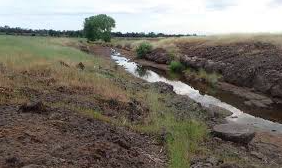
Toward the close of the program, we also read a statement concerning the proposed Stonegate Development in South Chico. This huge development would occupy 313 acres with approximately 500 housing units. Environmental activists are deeply concern that it would be destructive to vernal pools, the endangered Butte County Meadowfoam, bird and crustacean habitat, wetlands, and aesthetics. We suggest alternatives, including downsizing the project and limiting it to the west side of Bruce Road and, better, working on plans to use available land in Chico for infill projects that are more environmentally sustainable, including ease of public transport, use of bikes and walking, and reduction of greenhouse gases.
Listen to the program. Click on the link below.
Listen to the program. Click on the link below.
JAWS AND THE MOB
ECO 461 MAY 16, 2018
With a modest attempt at levity, we called this program "Jaws and the Mob." Read on, or better, listen to the program to understand why this is a serious topic that has nothing to do with sharks or gangsters.
Our guests were Sandra Kahn and Paul Ehrlich of Stanford University, who have collaborated on a new book titled Jaws: The Story of a Hidden Epidemic. Sandra is a Doctor of Dental Surgery and a practicing orthodontist as well as being on research teams at Stanford and the University of California, San Francisco. She is a pioneer in "frontodontics," a new approach to correcting jaw and teeth issues. Paul Ehrlich is an evolutionary biologist and the author of the revolutionary 1968 book, The Population Bomb. He continues his research and public education warning about the inevitable effects of the population explosion and its link to a host of other environmental, social, cultural, and economic issues.
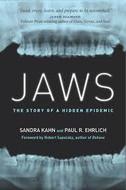
Jaws is about research showing that during the industrial era, roughly the past 200-300 years, eating habits and other byproducts of the good life have led to an epidemic of "malocclusion" problems: our teeth don't fit in our mouths and our jaws are weak and small. The result is a variety of direct and indirect health issues, including interference with sleep, mouth breathing, snoring, tiredness, and even stress that can be related to cancer and heart issues. Their book is addressed principally to parents of young children but includes additional advice for adults. It is published by Stanford University Press.

We also spoke with Paul about his Millennium Alliance for Humanity and the Biosphere (M-A-H-B, pronounced MOB) which seeks to link scientific research to public education and policy discussions. While Paul can cite numerous examples of projects around the world that are taking positive steps to solve population and environmental issues, he is openly pessimistic about humankind's ability to take steps to stave off collapse. Listen to this important interview with one of the most knowledgeable people on earth about the state of the planet and its human and other inhabitants. Also check out MAHB and join the conversation.
THE ENDANGERED SPECIES FAIR &
PROCESSION OF THE SPECIES
ECO 457 MAY 1, 2018

Annually, the Butte Environmental Council sponsors the Endangered Species Fair, combining booths and exhibits on nature preservation as well as music and other entertainment for family members. Within the fair is the Procession of the Species, a puppet parade with some 300 local youngsters who have done research and created stick puppets of creatures that are in need of help to avoid extinction.
In the first part of this program, we interviewed Angel Gomez of the Butte Environmental Council, which sponsors the event. She filled us in on the planned exhibits, entertainment, theme, and special attractions for this year's May 5 fair.
Then we spoke with twenty-seven (!) children ranging from first grade to middle school who have created puppets for the fair. They told us about their chosen creatures, the trials and tribulations and elations of puppet making, and what they think we should to to save endangered species. We also spoke with four teachers from Wildflower Open Classroom Charter School, Sherwood Montessori Charter, and Little Chico Creek Elementary. We wrapped up the program with the kids' singing “Feathers, Fur, and Fins,” by Australian Don Spencer, which the mass choir of all participating children will render at the Fair.
Listen to this very engaging program.
In the first part of this program, we interviewed Angel Gomez of the Butte Environmental Council, which sponsors the event. She filled us in on the planned exhibits, entertainment, theme, and special attractions for this year's May 5 fair.
Then we spoke with twenty-seven (!) children ranging from first grade to middle school who have created puppets for the fair. They told us about their chosen creatures, the trials and tribulations and elations of puppet making, and what they think we should to to save endangered species. We also spoke with four teachers from Wildflower Open Classroom Charter School, Sherwood Montessori Charter, and Little Chico Creek Elementary. We wrapped up the program with the kids' singing “Feathers, Fur, and Fins,” by Australian Don Spencer, which the mass choir of all participating children will render at the Fair.
Listen to this very engaging program.
CHAPMANTOWN COMMUNITY WELLNESS FAIR
ECO 456 APRIL 24, 2018
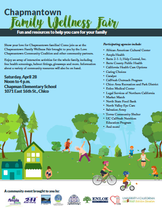
This week focused on the Chapmantown Family Wellness Fair, held in late April at the Chapman Elementary School. It was sponsored by Enloe Hospital Outreach, Chapman Elementary School, and the Love Chapmantown Community Coalition. Approximately 35 community agencies and nonprofits tabled to help people learn of the resources available to community members to keep themselves and their families healthy. The event was open to ALL NorthState Residents.
First we spoke with Alexandra Hajek,a Chico State University Social Work Intern who was instrumental helping coordinate the project.
First we spoke with Alexandra Hajek,a Chico State University Social Work Intern who was instrumental helping coordinate the project.

Then we talked with Ellen Michels, Senior Health Education Specialist with Butte County Public Health. She is Project Director of the county's Tobacco Education Program, which is concerned with a wide range of health issues created by smoking and vaping and offers programs designed to reduce smoking now and, in the longer range, create changes in the culture and environment which promotes smoking.

And finally we spoke with Karina Apodaca, CalFresh Outreach Program, and Jenny Breed, Program Director at the Center for Healthy Communities at Chico State. They described the range of community services available through their various programs, including support for low-income families, healthy eating initiatives, and services to Chico State students.
Listen to the program. Click below.
Listen to the program. Click below.
SusTainable groundwater project
eco 455 april 17, 2018
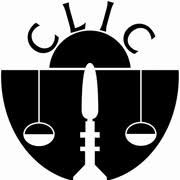
In this program, we interviewed Maggie Scarpa, Environmental Advocates Director of Chico State's Community Legal Information Center. Maggie and her interns, several of whom were with us in the studio, are studying implementation of California's Sustainable Groundwater Management Act, which is requiring analysis of groundwater use in over 400 individual water basins in the state. She and the students have been working in Butte and several other counties to see how governmental units are responding to the demands and criteria of SGMA. They reviewed their work and discussed the myriad complications in assessing and controlling groundwater use in sustainable ways.
Listen to the program.
Listen to the program.
INTEGRATIVE BIOLOGY AND PEST CONTROL
ECO 454 APRIL 3, 2018
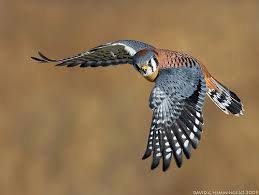
Our guest on this edition of Ecotopia was Catherine Lindell, who is an Associate Professor of Integrative Biology at Michigan State University. She she also holds a joint appointment with the Center for Global Change and Earth Observations, which fosters interdisciplinary approaches for understanding global change using the tools of both the social and bio-physical sciences.
We first learned of her work in an article in Science Daily with the headline, “Farmers around the world are turning to nature to help them reduce pesticide use, environmental impact and, subsequently, and in some cases, increasing yields.” https://www.sciencedaily.com/releases/2018/03/180301103715.htm
In this interview, Catherine described her work with kestrel falcons in Michigan to control unwanted creatures in Michigan cherry orchards and blueberry fields. She also told us about projects in Indonesia, Spain, New Zealand and elsewhere supporting vertebrate populations to keep down pests in crops as diverse as cacao and rice. She also discussed how this form of pest control is one tool in a farmer’s toolbox and described other, integrated means of controlling unwanted species and reducing the use of pesticides. Learn more about her work at <https://clindell.natsci.msu.edu/>.
Listen to the interview. Click below.
We first learned of her work in an article in Science Daily with the headline, “Farmers around the world are turning to nature to help them reduce pesticide use, environmental impact and, subsequently, and in some cases, increasing yields.” https://www.sciencedaily.com/releases/2018/03/180301103715.htm
In this interview, Catherine described her work with kestrel falcons in Michigan to control unwanted creatures in Michigan cherry orchards and blueberry fields. She also told us about projects in Indonesia, Spain, New Zealand and elsewhere supporting vertebrate populations to keep down pests in crops as diverse as cacao and rice. She also discussed how this form of pest control is one tool in a farmer’s toolbox and described other, integrated means of controlling unwanted species and reducing the use of pesticides. Learn more about her work at <https://clindell.natsci.msu.edu/>.
Listen to the interview. Click below.
CHICO FLAX
AMERICAN TOTEM
ECO 452 MARCH 20, 2018
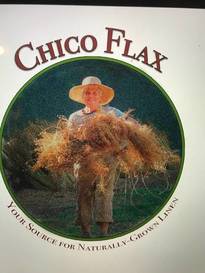
This was a two-part program. First we spoke with Sandy Fisher, Durl Van Alstyne, and Abby Wagner from Chico Flax, which is promoting and pioneering in the development of locally grown flax that is turned into linen cloth. They explained the rationale for local fabrics and described their work, which includes exploring flax varieties that grow in our region and developing tools to harvest and process flax efficiently. They have recently acquired several acres north of Chico and are working with the Chico State University departments of Agriculture, Engineering, and Business to explore new directions through a Flax Research Center. They also told us about Fibershed, nonprofit working throughout the state to promote local cloth. Check out the project at http://chicoflax.com.
Listen to the interview.
Listen to the interview.
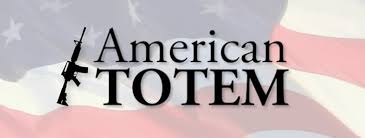
Then we spoke with Sue Hilderbrand, KZFR programmer (“The Real Issue”), political science instructor at Butte College, and the driving force behind “American Totem,” a film exploring gun violence and the gun culture in America—how guns have become an “American totem.” Sue shared some of the stories she heard as she made this film and offered insights into how her personal views have changed in the process. The film has been shown locally and will have its premiere shortly. Learn more about the film and how you can contribute to its making at http://www.americantotem.org or contact her directly: [email protected].
Listen to the Interview.
Listen to the Interview.
THIS WAY TO SUSTAINABILITY III
DAHR JAMAIL AND THE CONFERENCE ORGANIZERS
ECO 451 MARCH 13, 2018

This was the third of a series of interviews highlighting “This Way to Sustainability,” Chico State University's student-run environmental conference. We've interviewed all of the keynote speakers, and in this program we also interviewed the student organizers for this amazing conference.
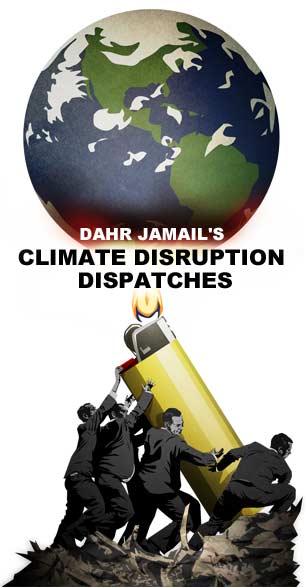
Our first interview was with keynoter Dahr Jamail. In late 2003, weary of the overall failure of the US media to accurately report on the realities of the war in Iraq for the Iraqi people and US soldiers, Dahr Jamail went to the Middle East to report on the war himself. Since then, he has become world renowned for documenting the human cost of the Iraq war: the everyday violence and terror, the deterioration of the healthcare system, the shortages of clean water and the resulting rise in sickness, the lack of jobs and economic opportunity, the refugee crisis, and the detention and torture of civilians and resistance fighters.
As he explains in this interview, after his work in the middle East, he has turned his attention to the environment, and takes a candid and rather bleak look at the future of the planet. His speech title for the Sustainability Conference is Update on the State of the Planet: How Then Shall We Live? His “Climage Disruption Dispatches” can be read at TruthOut <http://www.truth-out.org/news/item/22521-climate-disruption-dispatches-with-dahr-jamail>
Listen to the interview.
As he explains in this interview, after his work in the middle East, he has turned his attention to the environment, and takes a candid and rather bleak look at the future of the planet. His speech title for the Sustainability Conference is Update on the State of the Planet: How Then Shall We Live? His “Climage Disruption Dispatches” can be read at TruthOut <http://www.truth-out.org/news/item/22521-climate-disruption-dispatches-with-dahr-jamail>
Listen to the interview.
We then interviewed four of the CSU students who have been organizing the conference, Kelsey Koll, with an emphsais on donations and outreach; Lilly Ross, doing outreach and marketing; Ty Hartl on volunteer recruitment, a Michal Hanson, covering moderator assignments. They filled us in on the history of the conference, its themes and speakers, various awards and satellite activities, and the process by which they pulled it together.
We also expressed thanks to Teri Randolph of the Institute for Sustainable Development at CSU and Susan Tchudi, Ecotopia Co-Host and Convener of the Environmental Coalition of Butte County for arranging these interviews
Listen to the student organizers.
We also expressed thanks to Teri Randolph of the Institute for Sustainable Development at CSU and Susan Tchudi, Ecotopia Co-Host and Convener of the Environmental Coalition of Butte County for arranging these interviews
Listen to the student organizers.
THIS WAY TO SUSTAINABILITY II
CHERIE CHASTAIN AND KIMBERLY PRATHER
ECO 450 MARCH 6, 2018

This program looked forward to Chico State’s This Way to Sustainability Conference to be held March 15 and 16 at the Bell Memorial Union on the Chico State Campus. This was the second in our series of interviews with the five keynote and featured speakers who’ll be speaking at the conference.

We spoke first with Cheri Chastain. We imagine that everyone living in Chico knows about the Sierra Nevada Brewery and its reputation as being community-oriented and environmentally conscientious. But there is so much more to Sierra Nevada’s Sustainability efforts than the solar panels that cover the brewery’s parking lot. Cheri Chastain has been at the helm of Sierra Nevada’s sustainability efforts since 2006, and she filled us in on other work the brewery is doing to be sustainable, about a wide range of efforts the Brewery makes to maintain a small footprint.
Listen to the interview.
Listen to the interview.

Then we spoke with Dr. Kimberly Prather. Professor Prather holds a joint appointment in the Chemistry and Biochemistry Departments and as a Distinguished Professor at Scripps Institution of Oceanography at UC San Diego. She is the founding Director of the National Science Foundation Center for Chemical Innovation, Center for Aerosol Impacts on Chemistry of the Environment. Kim Prather has co-authored ~200 peer-reviewed publications and holds five patents for novel instruments currently being used to determine the sources of air pollution in around the world. Currently, Kim Prather heads The Prather Group, which researches chemistry and climate, “to determine which aerosol sources play the largest role in affecting key atmospheric processes. . . .” We had a lot of questions about what all this means, and were happy to have Kim Prather to explain it all.
Listen to the interview.
Listen to the interview.
THIS WAY TO SUSTAINABILITY I
MATT ST. CLAIR AND DAVE MONTGOMERY
ECO 449 FEBRUARY 27, 2018

This program was the first of three featuring the keynote speakers at Chico State University’s This Way to Sustainability Conference, held March 15-16, 2018.
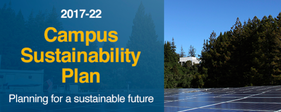
First we interviewed Matthew St. Clair, Director of Sustainability for the University of California’sOffice of the President. He’s been leading sustainability efforts on the ten campuses of the U-C system since 2004. He was a founding member of the Association for the Advancement of Sustainability in Higher Education. He’s also a member of the Board of Directors of Strategic Energy Innovations, a non-profit organization implementing energy conservation and sustainability education programs in California. He spoke with us about carbon neutrality and why universities should be trying to attain it. You can learn more about Matt and his work at <http://ucop.edu/sustainability/>,
Listen to the interview.
Listen to the interview.
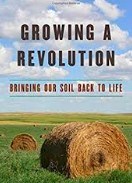
Then we spoke with David Montgomery who is a MacArthur Fellow and Professor of Geomorphology at the University of Washington. His research addresses the evolution of topography and the influence of geomorphological processes on ecological systems and human societies. His most recent book is Growing a Revolution: Bringing Our Soil Back to Life. In addition to telling us what “geomorphology” is all about, Dave described is observations from around the globe on how farmers and others are turning depleted soil—or just plain dirt—into productive cropland without invasive measures such as plows and tilling, artificial fertilizers, and industrial chemicals. Read more about his work and that of his colleagues at U-W at <http://gis.ess.washington.edu/grg/>.
Listen to the interview.
Listen to the interview.
INTERNATIONAL EDUCATION & CHICO ENVIRONMENTALISM
ECO 448 FEBRUARY 13, 2018

This was a a two-part program. First we discussed international education with Diana Parks, Director of International Training Programs at CSU and two teachers from abroad who are currently studying approachers to the teaching of English: Marvin Picado from Nicaragua and Manushak Petrosyan from Armenia. This is a six-week project, sponsored by the U.S. Department of State, including classroom instruction at CSU and a cultural visits ranging from Washington to Sacramento and centered in the NorthState. These remarkable educators have important things to say about excellent teaching around the globe.
Listen to that interview. Click below.
Listen to that interview. Click below.
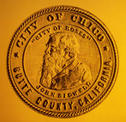
Then we be launched a new monthly series of programs prepared for us by Bill Mash, a highly gifted KZFR programmer. He recently interviewed Shane Romain with the city of Chico, Elaina McReynolds with Bidwell Park Watch, and Angel Gomez from the Butte Environmental Council, and asked them to provide an update on their work.
Listen to those interviews.
Listen to those interviews.
ZERO EMISSIONS 2040
ECO 446 JANUARY 30, 2018
In this program we interviewed two guests about a recent bill in the California legislature that would eliminate internal combustion engines from our highways by 2040. The bill is AB 1745 proposed by San Francisco Assemblyman Phil Ting. It would mandate purchase of all-electric or other nonpolluting vehicles beginning in 22 years. His website is <https://a19.asmdc.org>

First we discussed the bill with with Janelle London, who is Co-Executive Director of an organization called Coltura, which supports the bill and would actually like to get fossil-fueled vehicles off the roads in 12 years, by 2030. Learn more about their work at https://www.coltura.org

Then we spoke with Bob Allen of Urban Habitat in Oakland. He and his organization support Ting's Clean Cars 2040 bill but have concerns about social justice issues and the impact of the regulation on low income people who may not be able to afford the more expensive zero emissions cars. Learn more at <urbanhabitat.org>
Listen to the program; click below.
Listen to the program; click below.
THE PATTERNING INSTINCT
ECO 444 JANUARY 16, 2018
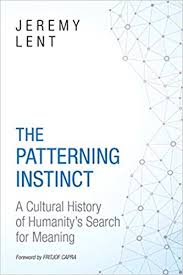
Our guest tonight was Jeremy Lent. He recently wrote an article for the Millenium Alliance for Humanity and the Biosphere titled “What Will It Really Take to Avoid Collapse?” <https://mahb.stanford.edu/?s=jeremy+lent&cat=225&post_type=post> He is also author of the book The Patterning Instinct : A Cultural History of Humanity’s Search for Meaning, published Prometheus Books <http://www.prometheusbooks.com>. Both the essay and the book are powerful arguments for understanding why humankind has done so much destruction to the earth and what we might do to change our ways. Jeremy was born, raised, and went to university in England before coming to the United States, where he had careers in business and the financial industry. In 2012 he founded the nonprofit Liology Institute, which, to quote from the website, “is dedicated to fostering a worldview in which the human discovery and experience of meaning in our lives is compatible with the findings of scientific investigation, offering a deeply integrated and coherent understanding of humanity’s place in our cosmos which could enable us to thrive on our planet harmoniously and sustainably.” Several listeners text right after the interview to say they found it especially engaging, informative, and challenging. Learn more about Jeremy and his work at: <http://www.liology.org> <https://www.jeremylent.com>
Listen to the Program.
Listen to the Program.
NEW YEAR'S REVOLUTIONS
THE REAL ISSUE JANUARY 3, 2018
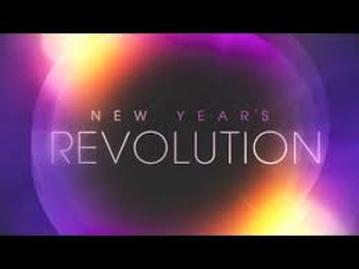
This program was a guest slot on The Real Issue and Steve interviewed three amazing Chico activists who spoke about their plans and priorities for the coming year and shared their thoughts on what concerned individuals and groups can do in less-than-optimal times for progressives.
Gayle Kimball has a Ph.D. in Religious Studies from UC Santa Barbara and had a long career as a high school and college teacher, does emotional balancing and other workshops, has written widely on emotional health and youth activism, answers questions in the Lotus Guide and on KZFR radio, and was once on Geraldo. She is presently finishing work on a new book, Strategies for Change. https://gaylekimball.info/
Aramenta Hawkins is the Executive Director of the Chico Peace and Justice Center; she was raised in Southern California, where she was involved in creating outreach programs for inner city youth of Los Angeles through her family’s nonprofit organization, Sports Spectacular. Later, she attended Chico State while serving the community of Butte County as a California Department of Forestry firefighter and first responder. After she received a BA in Organizational Communications from CSU, Chico she worked as a coordinator for several local grassroots organizations, including Frack-Free Butte County. Welcome, Aramenta Hawkins. http://www.chicopeace.org
Pamm Larry has BA in Religious Studies and particular interest in Ethical Theology. Growing up, she spent considerable time on her grandparents' farm in Creston, Iowa, where she first connected with the land. In Chico she has been a midwife and a business owner, and she has been the sparkplug in the Label GMO's movement in California and beyond. She continues the fight against GMOs and Monsanto's empire but has recently joined the Good Food Brigade movement for safe, local, tasty food, and typical for Pamm, is planning to hit the road in an RV to spread the word. http://www.goodfoodbrigade.org
Listen to the program. Click below.
Gayle Kimball has a Ph.D. in Religious Studies from UC Santa Barbara and had a long career as a high school and college teacher, does emotional balancing and other workshops, has written widely on emotional health and youth activism, answers questions in the Lotus Guide and on KZFR radio, and was once on Geraldo. She is presently finishing work on a new book, Strategies for Change. https://gaylekimball.info/
Aramenta Hawkins is the Executive Director of the Chico Peace and Justice Center; she was raised in Southern California, where she was involved in creating outreach programs for inner city youth of Los Angeles through her family’s nonprofit organization, Sports Spectacular. Later, she attended Chico State while serving the community of Butte County as a California Department of Forestry firefighter and first responder. After she received a BA in Organizational Communications from CSU, Chico she worked as a coordinator for several local grassroots organizations, including Frack-Free Butte County. Welcome, Aramenta Hawkins. http://www.chicopeace.org
Pamm Larry has BA in Religious Studies and particular interest in Ethical Theology. Growing up, she spent considerable time on her grandparents' farm in Creston, Iowa, where she first connected with the land. In Chico she has been a midwife and a business owner, and she has been the sparkplug in the Label GMO's movement in California and beyond. She continues the fight against GMOs and Monsanto's empire but has recently joined the Good Food Brigade movement for safe, local, tasty food, and typical for Pamm, is planning to hit the road in an RV to spread the word. http://www.goodfoodbrigade.org
Listen to the program. Click below.
SNOW GOOSE FESTIVAL
ECO 442 JANUARY 2, 2018
Our guests were Scott Huber, Conservation Director of the Altacal Audubon Society, and Jennifer Patten, Coordinator of the Snow Goose Festival, taking place in Chico January 24-28. Jennifer described the evolution of the festival from its beginnings in 1998 into what is one of the largest and most ambitious bird festivals in North America, with over 80 field trips, workshops, and more. They also spoke about the Pacific Flyway and providing fascinating information about bird migrations in our region. The festival website is snowgoosefestival.org.
Listen to the program. Click below.

